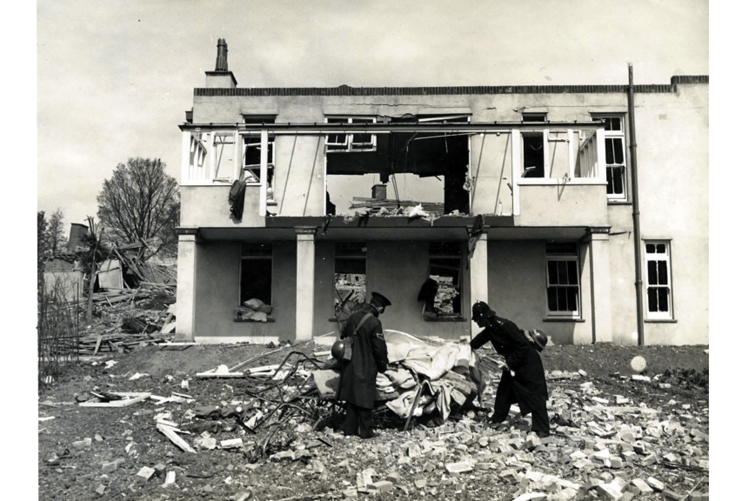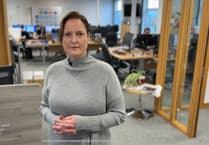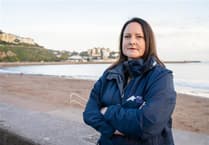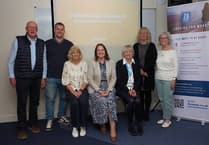A LONE Luftwaffe bomber reduced the older ‘cottage’ hospital to ruins, and in that debris seven patients and three nurses died.
Just as important, I do not know how many were injured and were left disabled in mind or body, or both. That it was the first hospital to be built by the NHS and opened in 1954, is often celebrated – as now on its 75th birthday, writes retired consultant, Doctor David Halpin.
But the Clinical Commissioning Group composed of general practitioners with a nominal one specialist member, has been forcing its closure for about 10 years. Those opposing this know how hard the slog has been. And why is this? The ‘Trust’ - the South Devon Healthcare Trust, has supported this second bombing in every possible way.
And yet it knows even its present value in providing a calm place for out-patient clinics, treatment like physiotherapy, and an operating theatre for day case surgery. The scope for this expands all the while. It knows too the vital place community hospitals provide as stepping stones when patients are ready to be discharged from the DGH.
This knowledge, and its contrary will to destroy, should have been reinforced by having to deal with patients waiting miserably for long hours in the A&E, and having ambulances stacked up outside. The patients within them had often waited too long to be picked by the good paramedics. Some would-be patients met earlier deaths at home or suffered delayed diagnosis and increased because of predictable and in fact criminal delay.
I add that we knew the value of day case surgery at the Princess Elizabeth Orthopaedic Hospital at Wonford, Exeter, many decades ago. The out-patients there was built to the design of one of my mentors, Geoffrey Blundell-Jones. The corridors and doorways were generous, and the many cubicles in this airy but plain building allowed for patients to be on trolleys so they could be brought to the theatres easily.
Latterly there were four very modern ones! So we could operate easily and with minimal delay after listing patients with a whole range of conditions, like for instance carpal tunnel syndrome. But that fine hospital with its 120 beds, an excellent staff of all skills, gardens, fine hydrotherapy pool etc had to be bombed as well – in 1996 and after a hell of a fight by we surgeons and many others.
When I stood as a truly independent person in the election of December 2019, a consultant at Torbay in a key specialism there said plainly that bed shortage was key in the failing hospital, and inferred closure of CH beds was a big factor.
This brings me to the third ‘player’ in this destructive and deeply malign process – those who govern us, or in fact rule us. I have given you plain evidence that all political parties have been dismantling OUR NHS in many and devious ways for about 40 years. This was started under what is called ‘conservative’ in irony, and you can find an account on the home page of my website dhalpin.infoaction.org.uk/ down on the right - ‘The NHS Dismantled’.
But there is a fourth agency in all this, and some find it awkward to discuss. Timidity is all about – keep quiet whilst our dear country and society is taken downwards.
This agency is general practice itself. But first I emphasise that there are good and very conscientious doctors out there, and many of these will know that things are running counter to the best interests of those who are ill and need good doctors’ minds and hands. But the tide runs against these doctors – swept along by currents that appear unstoppable. That feeling is often expressed – ‘I feel powerless’.
The first step was an actual Bill – in 2006. This was agreed by the then ‘Labour’ government with the BMA. It effectively removed the duty of general practitioners to provide emergency care through each hour of the day. Doctors’ health was being risked by added burdens, partly due I believe to increasing self-induced illness such as obesity, too many screening campaigns as for ‘cholesterol >statins’ - with inducements, and diktats from government to ostensibly ‘independent contractors’ – GPs.
Many were exhausted but, as so often with illness, the root causes were not looked for and dealt with. The central need was those vital face-to-face consultations with humans bringing ills of body or mind to them, was for time, skill and calm. I know well how in serving in orthopaedic clinics, with almost every patient suffering pain, and with 25 or more patients coming in to me how one feels that weight. The fracture clinics had more.
This step has lead directly to the overwhelming of the A&E departments, and to the increased 999 and other call outs of the ambulances. Trivial reasons for the latter do exist but are I believe in a minority. The automatic messages of the general practices direct patients away from those practices to an emergency system which is for ever being burdened more.
When I am driving, I almost always see the blue lights flashing. In more rational, and more kindly days, the GP would often attend the patient in an emergency. And he or she might diagnose and direct a simpler solution than ‘take him to hospital’.
There is much more I could say but I finish with two anecdotes.
Dr Cooper was the elder partner with her two colleagues – Mike and Sue Tuck, in Bishopsteignton. She picked up a patient with a bad cut, took her to Teignmouth Hospital and after cleaning the wound, sutured it!
Dr Barrie Clayton-Payne was among several of the good GPs in Teignmouth. A young woman student had returned from the Far East and was very ill. This was about 45 years ago.
The diagnosis or treatment was not fully grasped at Torbay Hospital though the physicians there were good. This GP diagnosed falciparum malaria – cerebral in its terrible manifestation. He treated her with quinine, the modern anti-malarial drugs not curing this deadly strain of malaria.
We can be sure that her care and cure took place in Teignmouth Community Hospital.
Imagine the joy in the staff and in her family.





Comments
This article has no comments yet. Be the first to leave a comment.